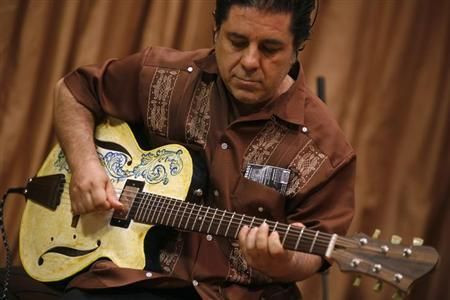Musicians Have Sharper Minds And Are Better Problem Solvers Than The Rest Of Us

“Music is moral law. It gives soul to the universe, wings to the mind, flight to the imagination, a charm to sadness, gaiety and life to everything,” Plato once said.
A research team from St. Andrews University claims that individuals who play a musical instrument are better problem solvers and are less likely to see their mental acuity decline due to age or illness. Not only were musicians able to identify a mistake and accurately correct it, but they also did so at a faster pace.
"Our study shows that even moderate levels of musical activity can benefit brain functioning,” explained lead researcher Dr. Ines Jentzsch. "Musical activity cannot only immensely enrich our lives but the associated benefits for our physical and mental functioning could be even more far-reaching than proposed in our and previous research."
Dr. Jentzsch and colleagues from St. Andrews used tests designed to gauge the mental awareness of both amateur musicians and non-musicians. Amateur musicians included those who spent a small amount of time practicing their instrument and those who practiced regularly, BBC reported.
By analyzing each participant’s behavioral and mental responses to the tests, researchers noticed that people who played an instrument were able to respond more quickly to a problem they encountered and fix it with accuracy. Individuals who played an instrument were also less likely to develop an illness related to brain degeneration.
“Our findings could have important implications as the processes involved are amongst the first to be affected by aging, as well as a number of mental illnesses such as depression,” Jentzsch added. “The research suggests that musical activity could be used as an effective intervention to slow, stop or even reverse age, or illness, related decline in mental functioning."
A similar study conducted at Stanford University included 17 men and women who had no formal musical training. Individuals participating in the study were hooked up to an fMRI machine while they listened to four symphonies from the composer William Boyce.
After nine-and-a-half minutes of listening, the team of researchers discovered a “highly distinctive and distributed set of brain regions” that was seen in all of the study’s participants. The team concluded that a higher level of cognitive functioning takes over when we are listening to music. “The study suggests one possible adaptive evolutionary purpose of music,” said co-author, Jonathan Berger, Ph.D.
Source: Mkrtchian A, Kansal N, Jentzsch I. Improved effectiveness of performance monitoring in amateur instrumental musicians. Neuropsychologia. 2013.
Published by Medicaldaily.com



























